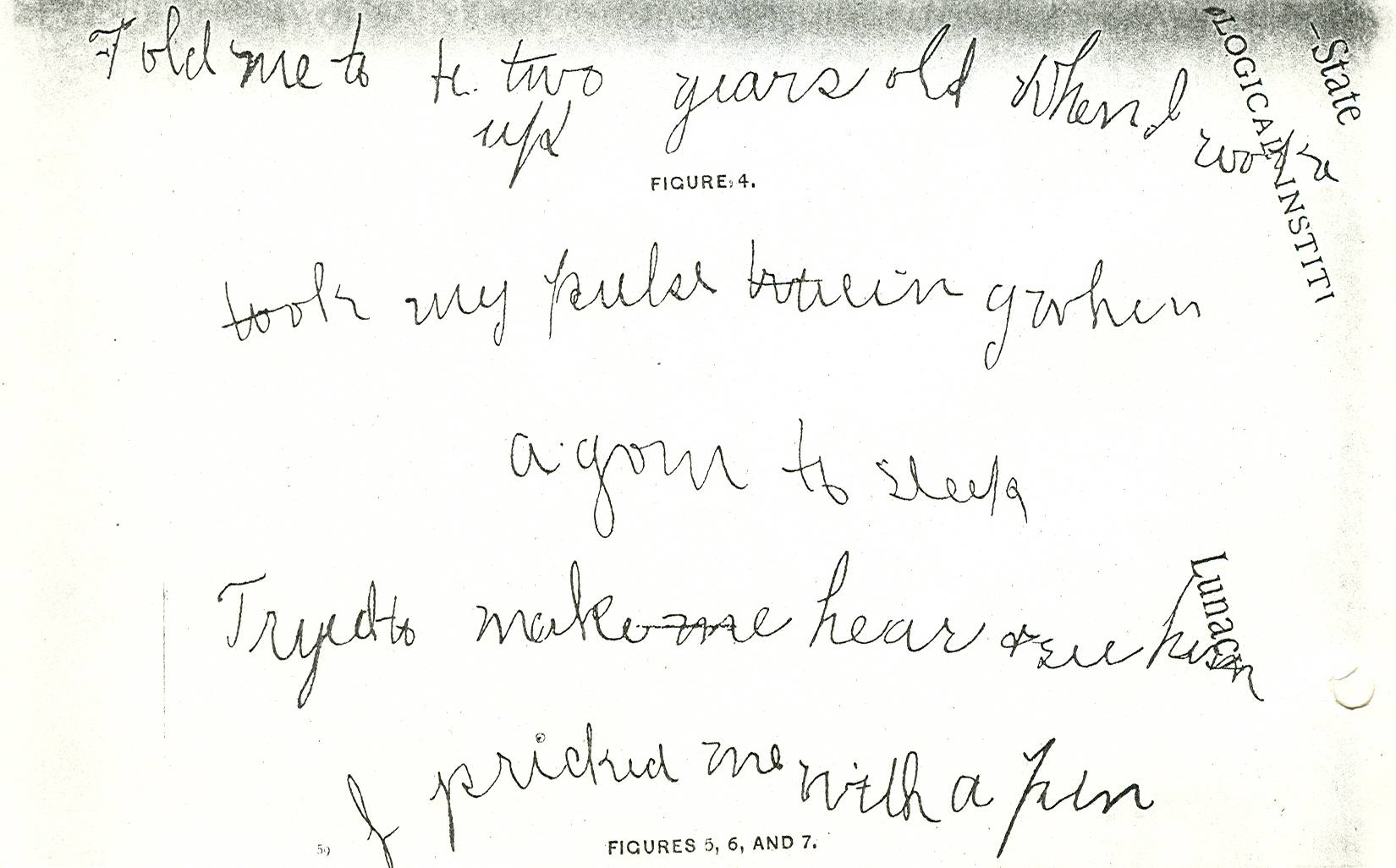
Home Boris Sidis Archives Table of Contents Next Chapter
|
PSYCHOPATHOLOGICAL
RESEARCHES Boris Sidis, M. A., Ph.D.,
M.D. © 1908
|
CHAPTER IV
SUBCONSCIOUS REACTIONS
PSYCHOMOTOR reactions of subconscious systems to external stimulations may have their parallel in cases of insistent ideas or phrases which come up unaccountably to consciousness and have to be pronounced whether the patient will or no. The subconscious dissociated systems seem to have taken possession of the patient's organs of speech and have given the answers to questions without her knowledge. It may be that the dissociated systems simply send up their reply in an insistent form and the patient has to pronounce the answer. In this case it is the personal consciousness that is indirectly made to answer and the patient is first conscious of the words or phrases before they are pronounced. It may, however, be as we have just suggested,―that the subconscious dissociated systems possess themselves of the patient's organs of speech and make the reply directly. In this case the answer does not come up in the form of an insistent idea and the patient becomes conscious of the answer only after it has been given.
In some of the experiments, however, it is clear that the first case holds true, because the patient when questioned replied that she had said the first thing that came into her mind. Furthermore, in those experiments which were carried on by the method of guessing, or by the method of immediate associative suggestion, where the patient had to tell anything that came into her mind, and she was thus giving correct answers, it was evident that the first case held true.
As an example of the second case, we give the following experiments:
Dr. S. gets D. F. up out of one chair and puts her in another. When questioned she said she was in the same chair in which she had first sat down and gone to sleep.
Dr. W. to D. F.: You will open your eyes but you will be unable to see Dr. S.
Dr. S. talks to her continually, but she avoids looking at him. When asked to look about for him, looks everywhere, but not in the direction where he is. When he holds up his hand she says she sees nothing. If Dr. W. holds up an object back of Dr. S.'s hand (which object she has not seen) and asks her what it is, she says it is Dr. W.'s hand.
Dr. W. takes a hat. She sees it. Dr. W. gives it to Dr. S. and he puts it on, and the hat appears to her as if suspended in air. She was told she could not see Dr. S.'s glasses, but when they moved she would say "Yes"; she does this, following the glasses with her eyes. Why she does this and why she says" Yes" she does not know, but says she could not help it.
When Dr. S. puts a lighted match to her eyes, the pupils react. Sclerotic sensitive to touch, but reaction very slight.
She was told to walk to another chair. Dr. S. held her hand and prevented her going. She resisted for some time, but afterwards remained passive and made no further attempts to go. When asked why she did not go, she answered she could not, something in the air prevented her. She does not look at Dr. S., but continually smiles. Dr. S. holds up a finger, which she is told she cannot see, but will follow it with her eyes. She does not see it, but pupils react to accommodation.
Dr. S. holds up newspaper, and tells her she cannot see it or his hand, but when finger points to word she will pronounce it. This she does, but immediately after cannot recall the words. If asked to recall them and the finger points to the words, she repeats them. When the paper is removed she does not know what she has said. Suggestions were given by Dr. W. that she could not remember the words, but could write them. She takes pen, and writes them. Asked if they are the words, says she "don't know"; says she wrote them because she could not help it.
An attempt was also made to experiment in personality metamorphosis. A suggestion was made that she was a child two years old. She claimed in answer to questions that she was two years old, and it took a special suggestion to remove this idea from her mind, but there was really no organization of a child personality; she did not behave as one would expect of a child, and she was able to write without the least change. This may be explained by the fact that the patient was extremely young, and her store of experiences was rather meagre. She had not sufficient mental material to personate the individuality suggested to her.
On awaking at the end of this long series of experiments, the patient had no recollection of what had passed.
She was asked then to shut her eyes; and a pen was given to her. She was told to try to recollect what occurred when asleep, but she could not remember anything. The pen meanwhile wrote without the patient's knowledge an account of what had occurred. (See Figure 4.)
